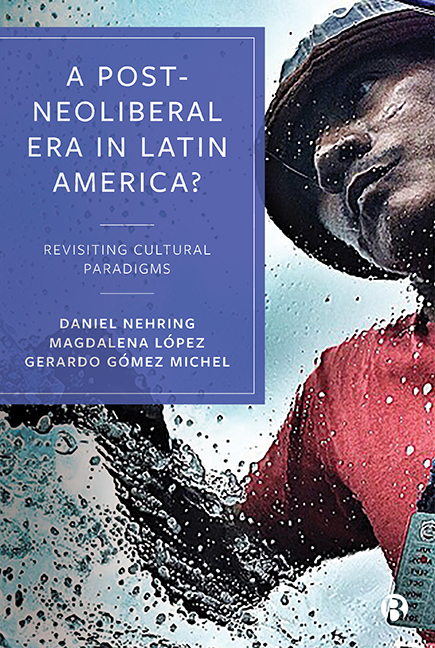Book contents
- Frontmatter
- Contents
- List of Tables and Figures
- Notes on Contributors
- 1 Introduction: Everyday Life in (Post-)Neoliberal Latin America
- 2 Imaginaries, Sociability and Cultural Patterns in the Post-Neoliberal Era: A Glance at the Argentinean, Paraguayan, and Venezuelan Experiences
- 3 Making Neoliberal Selves: Popular Psychology in Contemporary Mexico
- 4 From Uribe’s “Democratic Security” to Santo’s Peace Accords with the FARC: Hate, Fear, Hope and other Emotions in Contemporary Colombian Politics
- 5 Cine Bajo Tierra: Ecuador’s Booming Underground Cinema in the Aftermath of the Neoliberal Era
- 6 Neoliberalising Humanity: Culture and Popular Participation in the Case of the Street Market of Caruaru, Brazil
- 7 The Contribution of the Catholic Magazine Espacio Laical and the Constitution to the Cuban Public Sphere
- 8 Argentina: The Philosophical Resistance to the Conquest of the Soul1
- 9 Fleeing (Post-)Chávez Memories: The 1990s and the Black Friday Generation
- 10 Re-imagined Community: The Mapuche Nation in Neoliberal Chile
- 11 Neoliberalism and the Negotiation of the American Dream in Contemporary Latina Narratives
- 12 Bare Life in Contemporary Mexico: Everyday Violence and Folk Saints
- Index
3 - Making Neoliberal Selves: Popular Psychology in Contemporary Mexico
Published online by Cambridge University Press: 20 April 2022
- Frontmatter
- Contents
- List of Tables and Figures
- Notes on Contributors
- 1 Introduction: Everyday Life in (Post-)Neoliberal Latin America
- 2 Imaginaries, Sociability and Cultural Patterns in the Post-Neoliberal Era: A Glance at the Argentinean, Paraguayan, and Venezuelan Experiences
- 3 Making Neoliberal Selves: Popular Psychology in Contemporary Mexico
- 4 From Uribe’s “Democratic Security” to Santo’s Peace Accords with the FARC: Hate, Fear, Hope and other Emotions in Contemporary Colombian Politics
- 5 Cine Bajo Tierra: Ecuador’s Booming Underground Cinema in the Aftermath of the Neoliberal Era
- 6 Neoliberalising Humanity: Culture and Popular Participation in the Case of the Street Market of Caruaru, Brazil
- 7 The Contribution of the Catholic Magazine Espacio Laical and the Constitution to the Cuban Public Sphere
- 8 Argentina: The Philosophical Resistance to the Conquest of the Soul1
- 9 Fleeing (Post-)Chávez Memories: The 1990s and the Black Friday Generation
- 10 Re-imagined Community: The Mapuche Nation in Neoliberal Chile
- 11 Neoliberalism and the Negotiation of the American Dream in Contemporary Latina Narratives
- 12 Bare Life in Contemporary Mexico: Everyday Violence and Folk Saints
- Index
Summary
This chapter looks at narratives of personal development in self-help books in contemporary Mexico. In so doing, it explores the sociocultural significance of the ‘happiness industry’ that has come to play an outsized role in contemporary life. Across much of the world, from East Asia to the Americas, counseling sessions, personal development workshops, newspaper advice columns, self-help books, life advice apps for smartphones and a range of other media teach individuals how to be happy, how to be successful, how to make money, how to be happy, how to find love, how to get married, how to get divorced, and so forth (Watters, 2010; Nehring et al, 2016). The success of this happiness industry reflects to the extent to which psychotherapeutic narratives of the self and interpersonal relationships have seeped into everyday life and come to define moral visions of what a ‘good life’ might mean. This popularization of therapeutic narratives is closely bound up with the success of neoliberal political projects around the world, in so far as it tends to reinforce neoliberalism's emphasis on individual autonomy, choice and competition as basic principles of social interaction (Rimke, 2000; Gershon, 2011). In Mexico, popular psychology has likewise enjoyed considerable success over at least the past two decades, and its recipes for personal development have come to play a significant role in public life (Nehring, 2009a, 2009b).
This chapter has two objectives. First, it seeks to explore the proliferation of popular psychological narratives in contemporary Mexico. Its second aim is to examine the ways in which these narratives may reinforce or contest neoliberal discourses of the self and social relationships. To address these objectives, the chapter focuses on self-help books. Self-help books are didactic texts that offer their readers life advice on a range of issues, including work and professional development, marriage and family life, health and wellbeing, and spiritual concerns. Self-help books have a long history across the Western world, including Hispanic societies, which dates back at least to the manual of conduct and moral treatises of the 18th century (Secord, 2003; Mur Effing, 2009; Nehring et al, 2016). They set out, typically at considerable length, a moral grammar of personal conduct with regard to a specific reality of everyday life.
- Type
- Chapter
- Information
- A Post-Neoliberal Era in Latin America?Revisiting Cultural Paradigms, pp. 47 - 70Publisher: Bristol University PressPrint publication year: 2019



